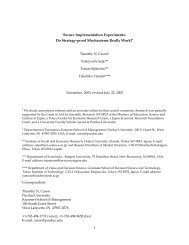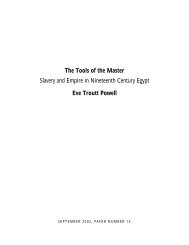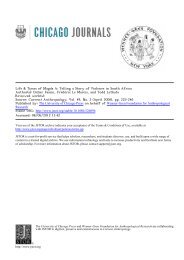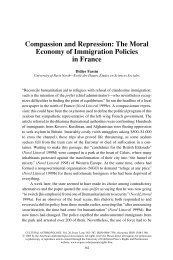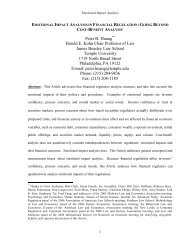Governance, Growth, and Development Decision-making - School of ...
Governance, Growth, and Development Decision-making - School of ...
Governance, Growth, and Development Decision-making - School of ...
Create successful ePaper yourself
Turn your PDF publications into a flip-book with our unique Google optimized e-Paper software.
ments lies with internal dynamics <strong>and</strong> we should strive to underst<strong>and</strong><br />
what generates positive internal dynamics rather than <strong>of</strong>fering<br />
recipes for general institutional improvements.<br />
3. Beware <strong>of</strong> the Pitfalls <strong>of</strong> Policy Reform <strong>and</strong><br />
Recognize the Political Economy Constraints<br />
While general institutional reform is beyond the reach <strong>of</strong> international<br />
intervention, World Bank economists, like other international<br />
policy actors, can <strong>and</strong> do encourage policy reform in various<br />
spheres. Such policy reform is an important part <strong>of</strong> the m<strong>and</strong>ate <strong>of</strong><br />
the World Bank. And yet, it is important to recognize that policy<br />
reform comes with major pitfalls.<br />
To underst<strong>and</strong> these pitfalls, note that policy reform is necessary,<br />
in general, not because country governments do not underst<strong>and</strong><br />
basic economic principles. Few politicians, for example, ever thought<br />
that hyperinflation would be good for economic growth. Hyperinflation<br />
<strong>of</strong>ten results from institutional equilibria, where politicians have<br />
incorrect incentives <strong>and</strong> must rely on deficits <strong>and</strong> inflation to buy<br />
support or to enrich themselves. These policies thus have their roots<br />
in the political economy problems <strong>of</strong> the society. These problems include<br />
weak constraints on politicians that make it possible for them<br />
to pursue policies to enrich themselves, political environments where<br />
it is possible or even necessary for politicians to use clientelistic policies<br />
<strong>and</strong> p<strong>and</strong>er to the powerful constituencies in order to remain<br />
in power, <strong>and</strong> political institutions that fail to provide incentives to<br />
politicians to invest in public goods for the majority <strong>of</strong> the population.<br />
These political economy problems will not be solved overnight.<br />
Any policy reform must come to grips with these problems <strong>and</strong> the<br />
perverse incentives that they create. Implementing central bank<br />
independence in Africa or in other institutionally weak societies will<br />
be <strong>of</strong>ten unsuccessful because the political economy factors leading<br />
to distortionary policies in the first place are still present.<br />
Policy reform that does not heed the political economy context<br />
might also lead to a distinctive seesaw pattern, with new policy dis-<br />
<br />
<strong>Governance</strong>, <strong>Growth</strong>, <strong>and</strong> <strong>Development</strong> <strong>Decision</strong>-<strong>making</strong>



